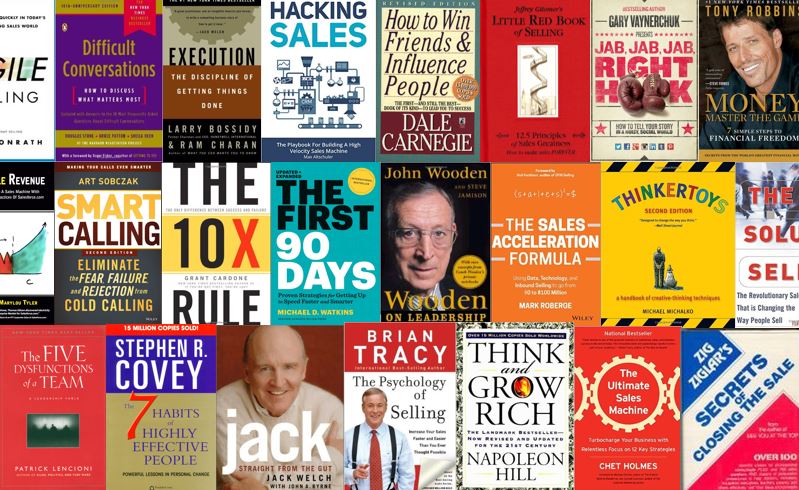The importance of leadership qualities and abilities cannot be overstated. Especially not to the entrepreneur. Whether you’re looking at leadership in a personal capacity or at the head of a group it is an absolutely essential discipline to master. A great many books have been written on the subject and I’ve compiled a list of 10 books to help you understand and execute leadership better
Good to great by Jim Collins
To find the keys to greatness, Collins’s 21-person research team read and coded 6,000 articles, generated more than 2,000 pages of interview transcripts and created 384 megabytes of computer data in a five-year project. The findings will surprise many readers and, quite frankly, upset others.
5 levels of leadership by John Maxwell
True leadership isn’t a matter of having a certain job or title. In fact, being chosen for a position is only the first of the five levels every effective leader achieves. To become more than “the boss” people follow only because they are required to, you have to master the ability to invest in people and inspire them. To grow further in your role, you must achieve results and build a team that produces. You need to help people to develop their skills to become leaders in their own right. And if you have the skill and dedication, you can reach the pinnacle of leadership-where experience will allow you to extend your influence beyond your immediate reach and time for the benefit of others.
7 Habits of Highly Effective People by Stephen Covey
When Stephen Covey first released The Seven Habits of Highly Effective People, the book became an instant rage because people suddenly got up and took notice that their lives were headed off in the wrong direction; and more than that, they realized that there were so many simple things they could do in order to navigate their life correctly. This book was a wonderful education for people, education on how to live life effectively and get closer to the ideal of being a ‘success’ in life.
Extreme Ownership by Jocko Willink and Leif Babin
Sent to the most violent battlefield in Iraq, Jocko Willink and Leif Babin’s SEAL task unit faced a seemingly impossible mission: help U.S. forces secure Ramadi, a city deemed “all but lost.” In gripping firsthand accounts of heroism, tragic loss, and hard-won victories in SEAL Team Three’s Task Unit Bruiser, they learned that leadership—at every level—is the most important factor in whether a team succeeds or fails. Willink and Babin returned home from deployment and instituted SEAL leadership training that helped forge the next generation of SEAL leaders. After departing the SEAL Teams, they launched Echelon Front, a company that teaches these same leadership principles to businesses and organizations. From promising startups to Fortune 500 companies, Babin and Willink have helped scores of clients across a broad range of industries build their own high-performance teams and dominate their battlefields.
48 Laws of Power by Robert Greene
This amoral, cunning, ruthless, and instructive book synthesizes the philosophies of Machiavelli, Sun Tzu, and Carl Von Clausewitz with the historical legacies of statesmen, warriors, seducers, and con men throughout the ages.
Start with why by Simon Sinek
Why are some people and organizations more innovative, more influential, and more profitable than others? Why do some command greater loyalty from customers and employees alike? Even among the successful, why are so few able to repeat their success over and over?
People like Martin Luther King Jr., Steve Jobs, and the Wright Brothers might have little in common, but they all started with why. It was their natural ability to start with why that enabled them to inspire those around them and to achieve remarkable things.
In studying the leaders who’ve had the greatest influence in the world, Simon Sinek discovered that they all think, act, and communicate in the exact same way—and it’s the complete opposite of what everyone else does. Sinek calls this powerful idea The Golden Circle, and it provides a framework upon which organizations can be built, movements can be lead, and people can be inspired. And it all starts with WHY.
Man’s search for meaning by Victor Frankl
Psychiatrist Viktor Frankl’s memoir has riveted generations of readers with its descriptions of life in Nazi death camps and its lessons for spiritual survival. Based on his own experience and the stories of his patients, Frankl argues that we cannot avoid suffering but we can choose how to cope with it, find meaning in it, and move forward with renewed purpose. At the heart of his theory, known as logotherapy, is a conviction that the primary human drive is not pleasure but the pursuit of what we find meaningful. Man’s Search for Meaning has become one of the most influential books in America; it continues to inspire us all to find significance in the very act of living.
The Innovators’ dilemma by Clayton M. Christensen
Harvard professor Clayton M. Christensen says outstanding companies can do everything right and still lose their market leadership — or worse, disappear completely. And he not only proves what he says, he tells others how to avoid a similar fate.
Focusing on “disruptive technology” — the Honda Super Cub, Intel’s 8088 processor, or the hydraulic excavator, for example — Christensen shows why most companies miss “the next great wave.” Whether in electronics or retailing, a successful company with established products will get pushed aside unless managers know when to abandon traditional business practices. Using the lessons of successes and failures from leading companies, “The Innovator’s Dilemma” presents a set of rules for capitalizing on the phenomenon of disruptive innovation.
How to win friends and influence people by Dale Carnegie
You can go after the job you want…and get it! You can take the job you have…and improve it! You can take any situation you’re in…and make it work for you!
Since its release in 1936, How to Win Friends and Influence People has sold more than 15 million copies. Dale Carnegie’s first book is a timeless bestseller, packed with rock-solid advice that has carried thousands of now famous people up the ladder of success in their business and personal lives.
As relevant as ever before, Dale Carnegie’s principles endure and will help you achieve your maximum potential in the complex and competitive modern age.
Learn the six ways to make people like you, the twelve ways to win people to your way of thinking, and the nine ways to change people without arousing resentment.
Leadership and self-deception by the Arbinger Institute
The “disease” of self-deception (acting in ways contrary to what one knows is right) underlies all leadership problems in today’s organizations, according to the premise of this work. However well-intentioned they may be, leaders who deceive themselves always end up undermining their own performance. This straightforward book explains how leaders can discover their own self-deceptions and learn how to escape destructive patterns. The authors demonstrate that breaking out of these patterns leads to improved teamwork, commitment, trust, communication, motivation, and leadership.
How many of these have you read? Make an effort to read these books as they offer some of the best insights into leadership and the approaches to it. Enjoy.








